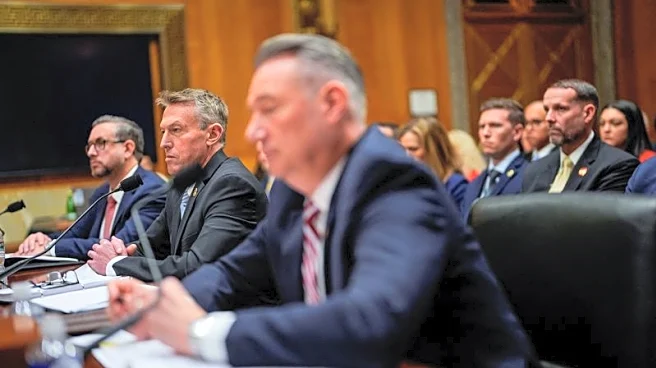What's Happening?
Nexstar, the largest owner of U.S. TV stations, has announced its acquisition of Tegna for $6.2 billion, including debt. This move is part of Nexstar's strategy to expand its reach, anticipating favorable regulatory changes under the Trump administration. The acquisition requires government approval, and public interest groups have raised concerns about the potential reduction in local news coverage due to such mega-mergers. Investors reacted positively, with shares in both companies rallying. The deal is contingent on the Federal Communications Commission (FCC) potentially loosening ownership limits, which currently cap companies at reaching 39% of U.S. TV households. Nexstar CEO Perry A. Sook emphasized the opportunities for local broadcasters to compete with Big Tech and legacy media companies.
Why It's Important?
The acquisition of Tegna by Nexstar represents a significant shift in the broadcast industry, potentially altering the landscape of local news coverage. If the FCC relaxes ownership limits, it could lead to further consolidation, impacting competition and diversity in media. Public interest groups argue that such consolidation may prioritize political advertising over local news, affecting the quality and variety of information available to communities. The deal highlights the ongoing tension between regulatory frameworks and industry demands for survival in the digital age. Stakeholders, including local communities and media companies, stand to be affected by changes in media ownership rules.
What's Next?
The FCC will review the acquisition application, assessing public interest implications. If ownership caps are relaxed, it could pave the way for more mergers, further consolidating the industry. Public interest groups may continue to advocate against such changes, emphasizing the need for diverse and independent local news sources. The outcome of the FCC's decision will be closely watched by industry analysts and stakeholders, as it could set a precedent for future media mergers.
Beyond the Headlines
The consolidation of local TV stations raises ethical and cultural concerns about the role of media in shaping public discourse. As ownership becomes concentrated, there is a risk of homogenized content that may not reflect the diverse perspectives of local communities. The debate over media consolidation touches on broader issues of media influence, political bias, and the preservation of democratic values in news reporting.











